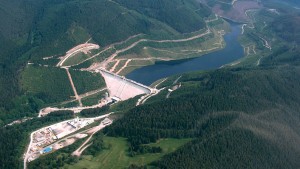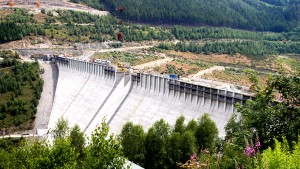Tasks Performed: Consultant responsible for development of the preliminary design and construction cost estimate for the proposed Roller Compacted Concrete (RCC) Alternative of Leibis Dam.
 Ueblacker Associates followed the development of this project since 1993 by studying the geological and geotechnical information and results of engineering analyses published in various reports. Based on these evaluations it was concluded that Roller Compacted Concrete (RCC) is a strongly viable option for Leibis Dam. Eventually, these efforts lead to a consulting assignment from HOCHTIEF to develop the preliminary design and construction cost estimate for the RCC alternative. Upon review of the tender documents, a preliminary design report was prepared in May 1999 for the RCC alternative which includes the following information and/or recommendations: Probable cross-sections of the dam; Suggested Facing options and details; Probable mix designs; Probable joint spacing and design details; A brief construction method statement; RCC volumes and target placement rates, and preliminary pricing considerations and ranges. The construction cost estimate and design details were prepared in collaboration with ASI-RCC, Inc., an experienced US engineering contractor in RCC dam construction.
Ueblacker Associates followed the development of this project since 1993 by studying the geological and geotechnical information and results of engineering analyses published in various reports. Based on these evaluations it was concluded that Roller Compacted Concrete (RCC) is a strongly viable option for Leibis Dam. Eventually, these efforts lead to a consulting assignment from HOCHTIEF to develop the preliminary design and construction cost estimate for the RCC alternative. Upon review of the tender documents, a preliminary design report was prepared in May 1999 for the RCC alternative which includes the following information and/or recommendations: Probable cross-sections of the dam; Suggested Facing options and details; Probable mix designs; Probable joint spacing and design details; A brief construction method statement; RCC volumes and target placement rates, and preliminary pricing considerations and ranges. The construction cost estimate and design details were prepared in collaboration with ASI-RCC, Inc., an experienced US engineering contractor in RCC dam construction.
Duration: 1993-1999 (6 months)
 Description: Leibis Dam, originally designed as a conventional mass concrete gravity structure, is the main feature of a new water storage project and would be the first RCC dam to be built in Germany. The dam is 102.5 m high and has a crest length of 370.0 m. The total volume of the dam mass is 550,000 m^3 of which 525,000 m^3 would be comprised of RCC. Rapid construction techniques account for major cost savings in RCC dams. When compared to conventional concrete dams, construction time for large projects can be reduced by 1 to 2 years. The RCC placement rate calculated for Leibis Dam is 2,700 m^3 per day and would allow the project to be completed in only 9 months at an estimated cost of approximately US$ 23.4 million. This represents a considerable savings to the project when compared with the cost of a conventional mass concrete gravity dam estimated at US$92.7 million.
Description: Leibis Dam, originally designed as a conventional mass concrete gravity structure, is the main feature of a new water storage project and would be the first RCC dam to be built in Germany. The dam is 102.5 m high and has a crest length of 370.0 m. The total volume of the dam mass is 550,000 m^3 of which 525,000 m^3 would be comprised of RCC. Rapid construction techniques account for major cost savings in RCC dams. When compared to conventional concrete dams, construction time for large projects can be reduced by 1 to 2 years. The RCC placement rate calculated for Leibis Dam is 2,700 m^3 per day and would allow the project to be completed in only 9 months at an estimated cost of approximately US$ 23.4 million. This represents a considerable savings to the project when compared with the cost of a conventional mass concrete gravity dam estimated at US$92.7 million.